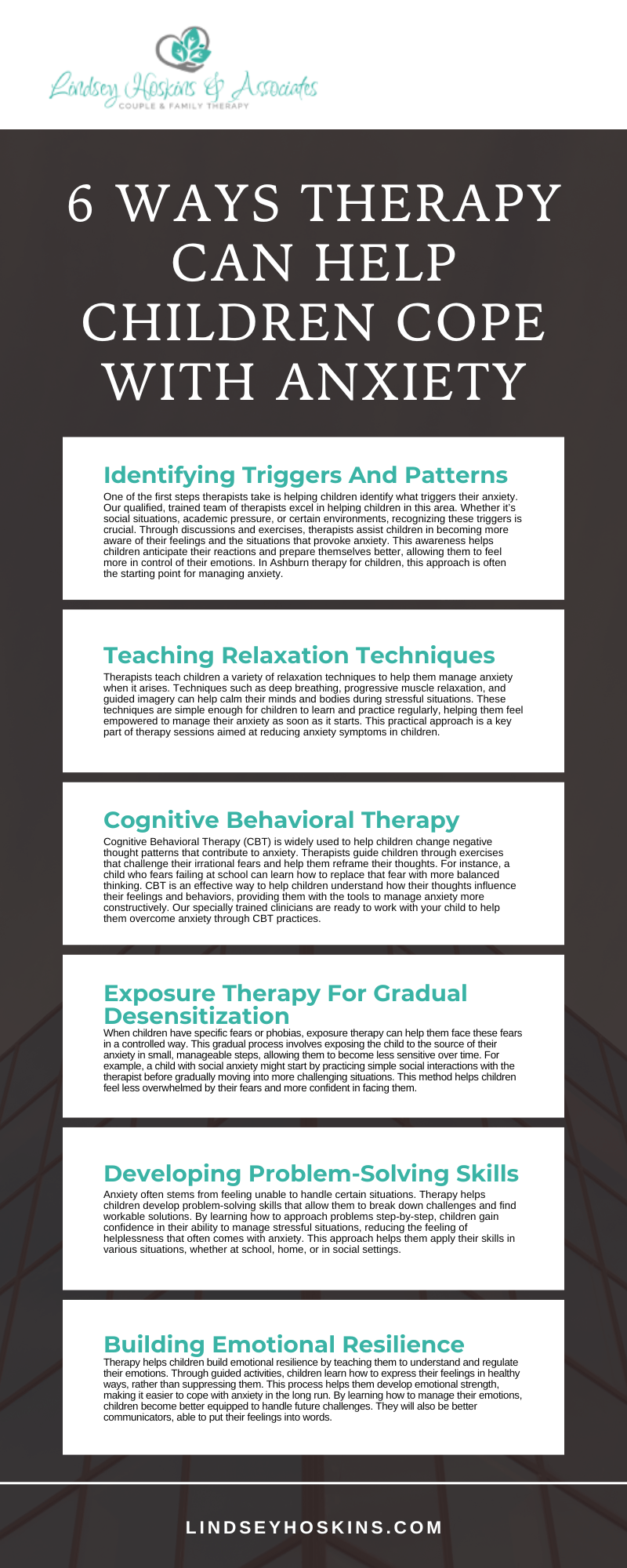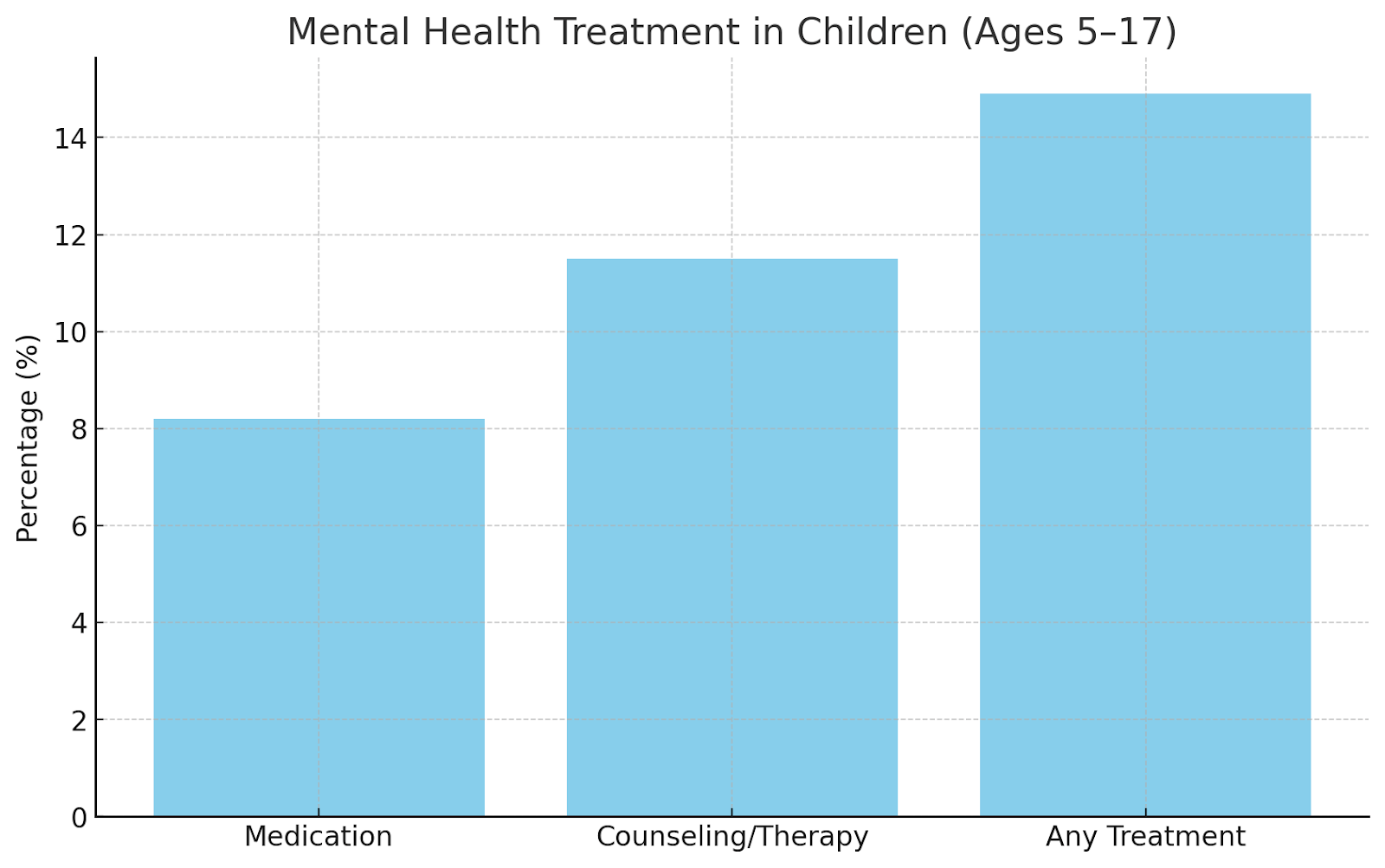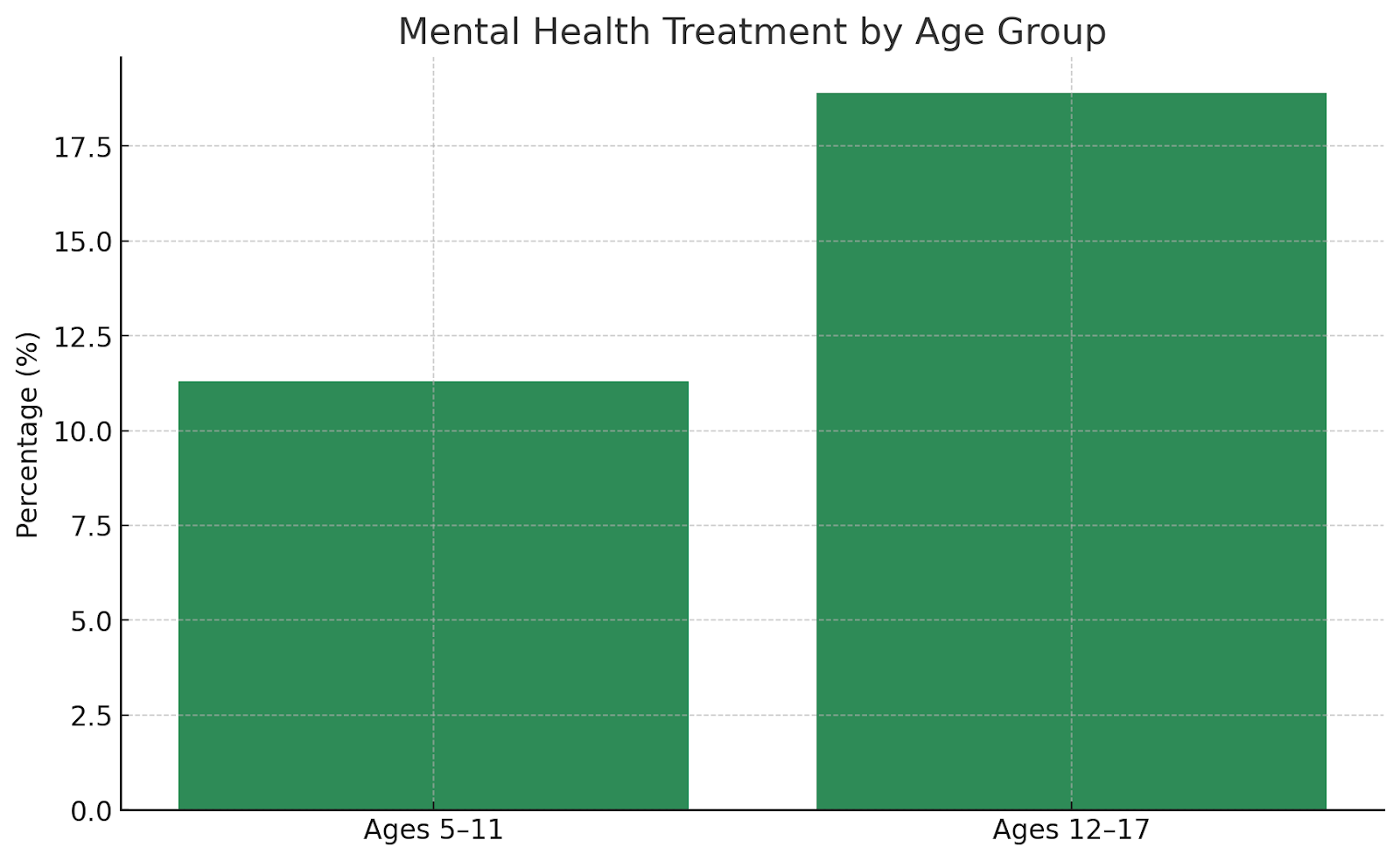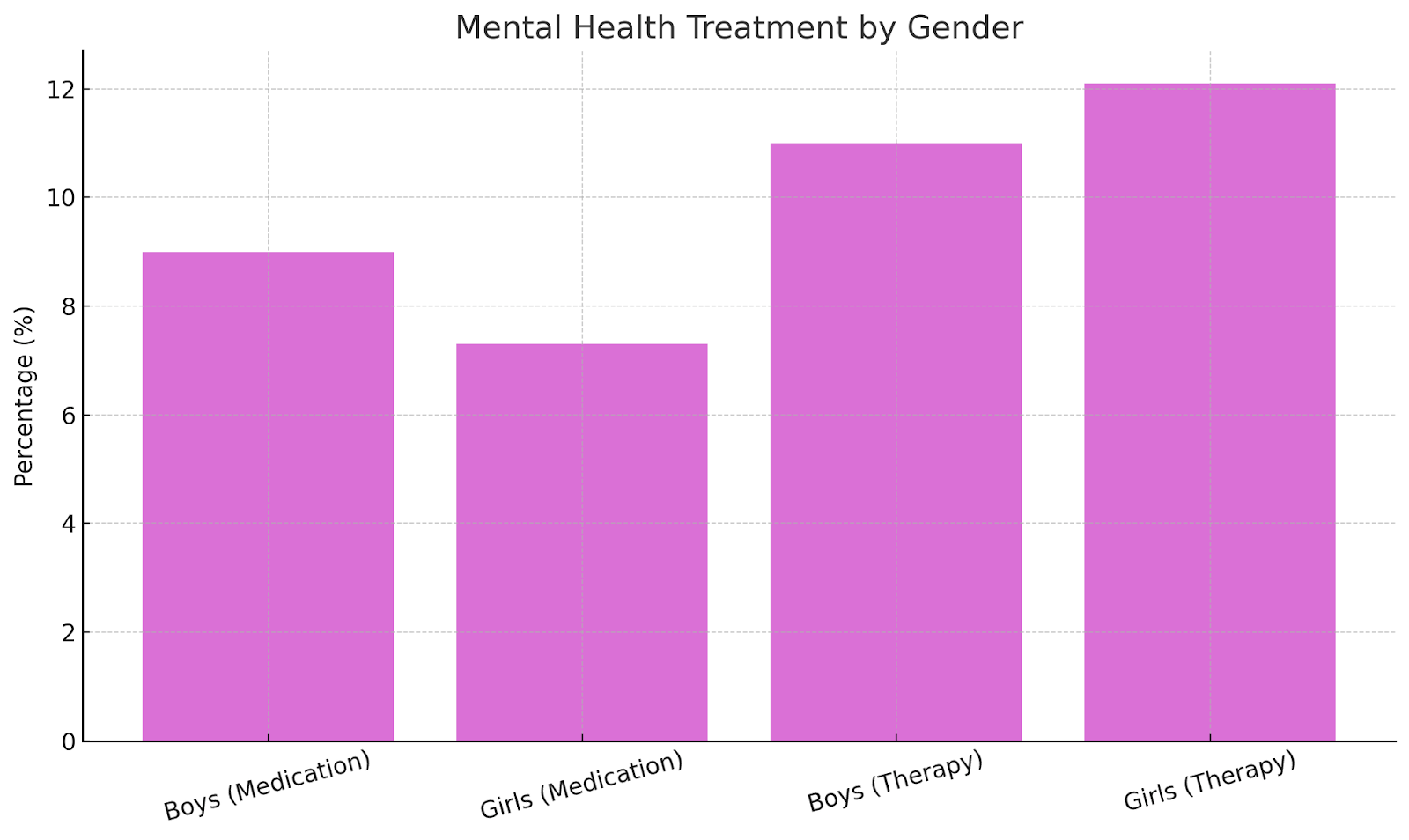Professional Therapy Tailored For Children
If your child is struggling and in need of therapy, our Ashburn, VA therapy for children services can help them receive the care and healing that they need. Our child therapists are trained to work with children and help them understand the cause of their struggles so that we can work together to help them address these issues.
We strive to treat all parents with both the serious attention they deserve and the kindness and light heart that they need to heal. With evening and weekend appointments available, we will work with your busy schedule to help you receive the care that you need. Contact Lindsey Hoskins & Associates today to schedule your free telephone consultation and find out how our team can help you with your trauma.
Identifying The Need For Child Therapy
Our Ashburn therapy for children is designed to assist children across a range of ages with a wide variety of issues and needs. We will work with you and your child to personally tailor sessions that help them receive the care and attention that they need. Understanding if therapy is right for your child is a personal matter for you and the child. Issues such as challenges with communication and relationships, academic struggles, anxiety, depression, mood swings, self-harm, behavioral challenges, stressful situations, change and transition, Attention Deficit Hyperactivity Disorder, Post Traumatic Stress Disorder, Obsessive-Compulsive Disorder, and more are all symptoms or issues that can be treated or assisted with during therapy. If you are unsure if therapy is right for your child, contact us today for a free consultation in which we will discuss your child’s situation and how we may be able to assist them.
Our Child Therapy Sessions
The primary goal of our Virginia child therapy sessions is to create a safe and comfortable space for your child. We know that therapy can be a frightening and unfamiliar experience for children, and we do our best to help them relax and feel at ease. Our therapy is a collaborative effort with your child to help them in the best manner possible for them personally. This may include through activities such as arts and crafts and playing with younger children or through meditation, discussion, journaling, and other forms of therapy for older children. We know that the child’s parents are an important part of child therapy. We work with parents and their children to identify the child’s specific needs, strengths, challenges, and goals in pursuit of the best possible therapy experience for all parties involved.
Discover How Our Therapy For Children Can Help Your Child
If you believe that therapy can help your child, our team is happy to discuss our services with you. We provide dedicated, compassionate, and personalized service to all of our patients. We promise to give your child the attention and care that they need as we build towards a better future for them together. For more information on our therapists and our services, contact our team at Lindsey Hoskins & Associates today to schedule your free telephone consultation.
Understanding Good Questions For A Therapist To Ask
The process of therapy is a collaborative journey between the therapist and the client as our Ashburn children therapy clinician can share. The questions a therapist asks play a crucial role in guiding the conversation and uncovering important insights about the client’s experiences and emotions. At Lindsey Hoskins & Associates, we know that asking the right questions can significantly impact the effectiveness of therapy, especially when it comes to specialized areas like therapy for children. Here, we explore the types of questions that can be particularly helpful in a therapeutic setting.
Exploring The Client’s Background
Understanding a client’s background is essential in therapy. This includes their family history, personal experiences, and the context of their current situation. Therapists often start with questions that help paint a picture of the client’s life. Questions about family dynamics, childhood experiences, and significant life events can provide a foundation for understanding the client’s current issues and behaviors. These questions help therapists identify patterns and influences that may be contributing to the client’s present difficulties.
Identifying Current Challenges
Therapists need to understand what brings the client to therapy at this specific point in time. Asking about the client’s current challenges helps focus the sessions on the most pressing issues. These questions might cover the client’s recent experiences, feelings, and behaviors that they find troubling. By identifying and discussing these challenges, therapists can prioritize the issues that need immediate attention and work with the client to develop strategies for addressing them. It also opens the floor for children to share anything they feel is important.
Exploring Emotions And Thoughts
A significant part of therapy involves exploring the client’s emotions and thoughts. Therapists ask questions that encourage clients to reflect on their feelings and cognitive processes. These questions help clients gain insight into how their emotions and thoughts influence their behaviors and experiences. By examining these internal processes, clients can develop a better understanding of themselves and learn to manage their emotions more effectively. These same questions are asked of adults and children in different forms so that everyone feels safe to share.
Assessing Coping Mechanisms
Understanding how clients cope with stress and adversity is crucial for effective therapy. Therapists ask questions about the client’s coping mechanisms to identify both healthy and unhealthy strategies. This information helps therapists guide clients towards more constructive ways of handling their challenges. Discussing coping mechanisms also provides an opportunity to introduce new techniques that can enhance the client’s ability to manage stress and emotions.
Setting Goals For Therapy
Setting goals is a collaborative process in therapy. Therapists ask questions that help clients articulate what they hope to achieve through therapy. These goals can be specific, such as improving communication skills or managing anxiety, or they can be more general, like achieving greater emotional balance. By setting clear goals, therapists and clients can work together more effectively and measure progress over time. Children work well with goals as it gives them something to work towards and makes them feel accomplished when they succeed.
Evaluating Relationships
Relationships play a significant role in an individual’s mental health. Therapists often ask questions about the client’s relationships with family, friends, and colleagues. Understanding these relationships helps therapists identify sources of support as well as areas of conflict or stress. Exploring relationships can also reveal patterns that affect the client’s interactions and overall well-being.
Understanding The Client’s Perspective
It’s important for therapists to understand how clients perceive their own experiences and issues. Asking questions that invite clients to share their perspectives helps build a strong therapeutic alliance. When clients feel heard and understood, they are more likely to engage fully in the therapeutic process. These questions also provide valuable insights into how clients view themselves and their situations, which can inform the therapeutic approach.
Exploring Strengths And Resources
Therapists ask questions to identify the client’s strengths and resources. Recognizing these positive attributes helps build the client’s confidence and resilience. By focusing on strengths, therapists can help clients leverage their existing resources to overcome anxiety and challenges and achieve their goals. This strengths-based approach fosters a sense of empowerment and encourages clients to recognize their own capabilities.
At Lindsey Hoskins & Associates, we believe that asking the right questions is key to effective therapy. If you are considering Ashburn therapy for children or seeking support for yourself, contact us today. Our team is here to provide compassionate and professional guidance tailored to your needs. Let us help you on your journey towards greater well-being and emotional health.
6 Ways Therapy Can Help Children Cope With Anxiety
Anxiety is a common issue for children, affecting their ability to manage everyday tasks and interactions. Our practice offers various strategies to help children learn how to cope with anxiety in a healthy way. Below are six ways therapy can help children manage anxiety.
1. Identifying Triggers And Patterns
One of the first steps therapists take is helping children identify what triggers their anxiety. Our qualified, trained team of therapists excel in helping children in this area. Whether it’s social situations, academic pressure, or certain environments, recognizing these triggers is crucial. Through discussions and exercises, therapists assist children in becoming more aware of their feelings and the situations that provoke anxiety. This awareness helps children anticipate their reactions and prepare themselves better, allowing them to feel more in control of their emotions. This approach is often the starting point for managing anxiety.
2. Teaching Relaxation Techniques
Therapists teach children a variety of relaxation techniques to help them manage anxiety when it arises. Techniques such as deep breathing, progressive muscle relaxation, and guided imagery can help calm their minds and bodies during stressful situations. These techniques are simple enough for children to learn and practice regularly, helping them feel empowered to manage their anxiety as soon as it starts. This practical approach is a key part of therapy sessions aimed at reducing anxiety symptoms in children.
3. Cognitive Behavioral Therapy (CBT)
Cognitive Behavioral Therapy (CBT) is widely used to help children change negative thought patterns that contribute to anxiety. Therapists guide children through exercises that challenge their irrational fears and help them reframe their thoughts. For instance, a child who fears failing at school can learn how to replace that fear with more balanced thinking. CBT is an effective way to help children understand how their thoughts influence their feelings and behaviors, providing them with the tools to manage anxiety more constructively. Our specially trained clinicians are ready to work with your child to help them overcome anxiety through CBT practices.
4. Exposure Therapy For Gradual Desensitization
When children have specific fears or phobias, exposure therapy can help them face these fears in a controlled way. This gradual process involves exposing the child to the source of their anxiety in small, manageable steps, allowing them to become less sensitive over time. For example, a child with social anxiety might start by practicing simple social interactions with the therapist before gradually moving into more challenging situations. This method helps children feel less overwhelmed by their fears and more confident in facing them.
5. Developing Problem-Solving Skills
Anxiety often stems from feeling unable to handle certain situations. Therapy helps children develop problem-solving skills that allow them to break down challenges and find workable solutions. By learning how to approach problems step-by-step, children gain confidence in their ability to manage stressful situations, reducing the feeling of helplessness that often comes with anxiety. This approach helps them apply their skills in various situations, whether at school, home, or in social settings.
6. Building Emotional Resilience
Therapy helps children build emotional resilience by teaching them to understand and regulate their emotions. Through guided activities, children learn how to express their feelings in healthy ways, rather than suppressing them. This process helps them develop emotional strength, making it easier to cope with anxiety in the long run. By learning how to manage their emotions, children become better equipped to handle future challenges. They will also be better communicators, able to put their feelings into words.
Therapy provides a safe space for children to explore their anxiety and learn how to manage it effectively. With the right strategies, children can develop the confidence and skills needed to cope with anxious feelings in healthier ways. If your child is struggling with anxiety, our therapy for children services at Lindsey Hoskins & Associates can offer the support they need. Contact us today to schedule a consultation and begin the journey toward emotional well-being for your child.
Ashburn Therapy For Children Infographic
Ashburn Therapy For Children Statistics
Therapy plays a vital role in supporting children’s mental health, addressing conditions such as anxiety, depression, and behavioral disorders. According to the Centers for Disease Control and Prevention (CDC), in 2021, approximately 14.9% of U.S. children aged 5–17 received mental health treatment within the past year. This encompasses 8.2% who took medication and 11.5% who received counseling or therapy from a mental health professional.
Age significantly influences treatment rates. Children aged 12–17 were more likely to receive mental health services compared to those aged 5–11, with 18.9% of older children receiving treatment versus 11.3% of younger children. Specifically, 14.6% of adolescents received counseling or therapy, compared to 8.7% of younger children.
Gender differences were also observed. Boys were more likely than girls to have taken medication for their mental health (9.0% vs. 7.3%). However, there was no significant difference between boys and girls in receiving counseling or therapy (11.0% vs. 12.1%).
Ashburn Therapy For Children FAQs
At Lindsey Hoskins & Associates, we understand that seeking therapy for your child can feel overwhelming, but it’s an important step in supporting their mental and emotional well-being. If you’re considering our Ashburn child therapy services, you likely have many questions. Below, we’ve answered some of the most common questions parents ask when starting therapy for their children.
How Long Does Therapy For Children Typically Last?
Therapy for children can vary in length depending on the child’s needs and the type of therapy being provided. Typically, sessions last between 45 minutes to an hour. Some children may only need a few sessions, while others may benefit from longer-term therapy. It’s important to remember that therapy is a personalized process, and the duration can be adjusted based on your child’s progress. If you’re looking for therapy for your children in or near Ashburn, VA, we can discuss a treatment plan that works best for your child’s unique needs. Our therapists have clinical degrees and are ready to do what is best for your child’s situation.
What Should I Expect During My Child’s First Therapy Session?
During your child’s first therapy session, they may feel a bit nervous or uncertain, which is completely normal. Initially, the therapist will take time to build trust with your child by creating a safe, welcoming space. The first session may involve the therapist learning more about your child’s history, challenges, and goals for therapy. If you’re unsure about how to support your child through this process, we are happy to guide you through the experience.
Can Therapy Help Children With Behavioral Issues?
Yes, therapy can be very helpful in addressing behavioral issues in children. In fact, our therapists cover a variety of areas of child therapy from development to parental relationships. Through therapy, children can learn how to express their emotions, understand their behaviors, and develop coping strategies. Many children benefit from different types of therapy, such as cognitive-behavioral therapy (CBT) or play therapy, to help them manage behaviors like aggression, defiance, or anxiety. We provide a safe space for your child to work through their feelings in a constructive way.
What Age Is Appropriate To Start Therapy For Children?
There’s no specific age to start therapy for children, as it depends on the individual child’s needs. Some children benefit from therapy as early as preschool, especially if they’re struggling with issues like separation anxiety or social difficulties. For older children and adolescents, therapy can help with challenges related to school, friendships, family dynamics, and emotional regulation. Whether your child is young or a teenager, therapy can be tailored to meet their developmental stage and emotional needs.
How Do I Talk To My Child About Going To Therapy?
Talking to your child about going to therapy can be done in a supportive and positive way. It’s best to approach the topic with openness and honesty, explaining that therapy is a place where they can talk about their feelings and get help for anything that’s bothering them. Emphasize that therapy is a safe, non-judgmental space, and that it’s okay to ask questions and express themselves freely. You might say, “Therapy is like having a safe place where you can talk and get help to feel better.” Encouraging your child to feel comfortable about therapy is a key part of their success. If your child expresses issues with therapy, bring that up to the therapist so they can help facilitate that conversation.
Get Started Today
If you’re considering therapy for your child and have more questions, we’re here to help. At Lindsey Hoskins & Associates, we offer compassionate and effective therapy for children. Contact us today to learn more about how we can support your child’s mental health and emotional development.
7 Ways Therapy Supports Children With Learning Disabilities
Children with learning disabilities often face challenges that extend beyond academics, affecting their self-esteem, social interactions, and emotional well-being. Asburn, VA therapy for children provides a supportive environment to address these issues and equip children with tools to succeed. At Lindsey Hoskins & Associates, we understand the importance of tailored therapeutic approaches for children and their families. Here are seven key ways therapy can make a positive impact.
- Improving Emotional Regulation: Therapy helps children recognize and understand their emotions, teaching them strategies to manage frustration, anxiety, or sadness that may arise from their learning challenges. This emotional support allows children to approach obstacles with greater resilience and a sense of control over their reactions. A therapist will work to help children identify what they are feeling and how to experience it.
- Building Confidence And Self-Esteem: Children with learning disabilities often experience feelings of inadequacy or self-doubt. Therapists work to identify a child’s strengths, celebrating their achievements while addressing areas of difficulty. This balanced approach builds confidence and empowers children to see their value beyond academic performance.
- Developing Coping Mechanisms: Learning disabilities can lead to stress in educational and social settings. Ashburn therapy for children assesses the needs of your child and equips children with coping mechanisms to deal with these stressors, such as relaxation techniques, problem-solving skills, and positive self-talk, giving them tools to manage daily challenges effectively.
- Enhancing Social Skills: Difficulty with social interactions is common among children with learning disabilities. Therapy provides a safe space for practicing skills such as active listening, turn-taking, and conflict resolution. Over time, these sessions help children form and maintain positive relationships with peers and adults. This practice will also help children as they turn into adults themselves and are able to continue to grow in a healthy manner.
- Addressing Behavioral Challenges: Therapists can identify behaviors linked to frustration or feelings of inadequacy and help children replace them with constructive alternatives. This might include teaching patience, impulse control, or alternative ways to express themselves, reducing conflicts at home and school.
- Strengthening Parent-Child Communication: Parents play a key role in supporting children with learning disabilities. Therapy often involves family sessions that focus on improving communication, understanding the child’s unique needs, and creating an environment that fosters growth and encouragement.
- Fostering Academic Resilience: Therapy helps children reframe how they approach learning challenges, shifting the focus from perceived failures to the effort and strategies they apply. This mindset fosters academic resilience, encouraging them to keep trying despite setbacks. It will also help them in future careers to keep going and work to solve problems.
At Lindsey Hoskins & Associates, our team is made up of specially-trained clinicians who understand the unique needs of children with learning disabilities. Several of our therapists have a clinical special interest in therapy for children, ensuring that your child receives focused and compassionate care.
If you’re seeking support through child therapy, our practice offers a welcoming environment for families. Therapy not only helps children thrive but also empowers parents to provide the guidance their child needs. Contact us today to learn more about how we can support your family.
Children Therapy FAQs
When children face emotional or behavioral challenges, therapy can provide the support they need to work through difficulties and develop healthy coping skills. Whether a child is struggling with changes in the family, school-related stress, or behavioral concerns, professional counseling can be a valuable tool. At Lindsey Hoskins & Associates, we offer therapy tailored to the unique needs of each child and their family.
What Is The Difference Between Individual And Family Therapy For Children?
Individual therapy focuses on helping a child address personal emotions, behaviors, or challenges in a private setting. The therapist works one-on-one with the child, using age-appropriate techniques to encourage expression and problem-solving. Family therapy, on the other hand, involves parents, siblings, or other family members in the process. This type of therapy helps improve communication, resolve conflicts, and create a more supportive home environment. Some children may benefit from a combination of both approaches, depending on their specific situation. Parents may benefit from both as well to learn tools to better communicate with their children.
Can Therapy Help Children Cope With Divorce?
Therapy can be an effective way for a child dealing with the impacts of a custody case. Many children experience confusion, sadness, or anxiety when their parents separate, and a therapist provides a safe space to express these feelings. Through therapy, children learn ways to manage changes in their family structure, build emotional resilience, and develop strategies to express their needs. Our Ashburn therapy specialist for children offers structured support to help children adjust to these life changes in a healthy way.
How Do I Know If My Child Needs Therapy?
Signs that a child may benefit from therapy include persistent sadness, withdrawal from friends or activities, frequent emotional outbursts, difficulty concentrating, or sudden changes in behavior. Other indicators include trouble sleeping, excessive worry, or declining performance in school. If these behaviors last for an extended period or interfere with daily life, therapy can provide valuable support. A professional therapist can assess the child’s needs and recommend the most appropriate approach. They will also provide tools for you as a parent to work through tough situations such as handling meltdowns.
What Are The Benefits Of Therapy For Children?
Therapy provides children with tools to understand and manage their emotions in a healthy way. It can help improve self-esteem, strengthen social skills, and teach effective ways to cope with stress or anxiety. Children who participate in therapy often develop better problem-solving abilities and learn techniques to handle challenges more effectively. Therapy for children is designed to create a supportive environment where children feel comfortable expressing themselves and working toward positive change.
Is Therapy Effective For Children With ADHD?
Yes, therapy can be highly effective for children with ADHD. While medication is sometimes used to manage symptoms, behavioral therapy helps children develop skills to improve focus, impulse control, and emotional regulation. Therapists work with children to practice strategies that enhance organization, decision-making, and social interactions. Parents can also be involved in therapy sessions to learn ways to reinforce positive behaviors at home. In fact, this is often true of many conditions your child may be diagnosed with. Therapy for children can be tailored to meet the unique needs of those with ADHD or any other diagnoses, providing them with practical strategies to succeed in everyday life.
Our therapists have clinical degrees with special interests to cover every aspect of therapy you might need. We understand that families have busy schedules, which is why our team offers weekend appointments to work with your schedule. If your child is struggling with emotional or behavioral challenges, we are here to help. Contact Lindsey Hoskins & Associates today to learn more about our therapy services and how we can support your child’s well-being.
Ashburn Therapy For Children Glossary
At Lindsey Hoskins & Associates, we provide therapy services for children to support families dealing with emotional, behavioral, and developmental challenges. Whether you are seeking therapy after an accident or traumatic event, to deal with a disability or disorder, or for another reason, our team of qualified and dedicated therapists is here to help you. Contact us today for your free telephone consultation.
Mediation
Mediation in the context of child therapy often refers to a neutral process that helps families work through disagreements or communication barriers. Our therapist may use mediation to support parents and children in resolving issues such as parenting approaches, co-parenting arrangements, or emotional conflicts that may affect a child’s well-being.
Coping Mechanisms
Coping mechanisms are the strategies children use to handle stress, anxiety, or emotional discomfort. Our team works hard to help nurture healthy, productive coping mechanisms. During sessions, we help children develop practical, age-appropriate skills to respond to difficult emotions or situations in healthy ways. These might include breathing exercises, journaling, or structured routines. Over time, effective coping skills can support emotional regulation and improve day-to-day behavior at school and home.
Attention Deficit Hyperactivity Disorder (ADHD)
Children diagnosed with Attention Deficit Hyperactivity Disorder (ADHD) often struggle with focus, impulsivity, and restlessness. In Maryland therapy for children, we work with families to address the behavioral and emotional effects of ADHD, using tools like behavioral therapy, parental guidance, and communication strategies. Treatment may also involve collaboration with medical providers or school staff to support the child across environments.
Post Traumatic Stress Disorder PTSD In Children
Post Traumatic Stress Disorder (PTSD) can develop in children who have experienced or witnessed traumatic events. Symptoms may include sleep disturbances, emotional outbursts, avoidance behaviors, and difficulty concentrating. We use trauma-informed approaches to help children process their experiences in a safe and supportive space. Therapy for PTSD often includes building trust, managing triggers, and reinforcing a sense of safety. If your child is suffering from PTSD, contacting our office can help you understand how therapy may be able to help them both now and in the long-term.
Obsessive Compulsive Disorder (OCD)
Obsessive Compulsive Disorder (OCD) involves unwanted, recurring thoughts and repetitive behaviors that a child may feel driven to perform. These symptoms can interfere with daily routines and emotional well-being. We focus on helping children recognize these patterns and develop tools to reduce compulsive behaviors over time. Therapy often includes cognitive-behavioral techniques designed to change the thought-behavior cycle in a manageable way. Our therapists have much experience helping children with OCD, and we will use this knowledge to help your child in a healthy, effective, and personalized manner.
If you’re looking for supportive, effective therapy for children in Ashburn, VA, our team at Lindsey Hoskins & Associates is here to help. We offer evening and weekend appointments in order to fit your schedule. Let’s work together to support your child’s mental and emotional growth. Contact our office today to discuss how therapy might be right for your child.







